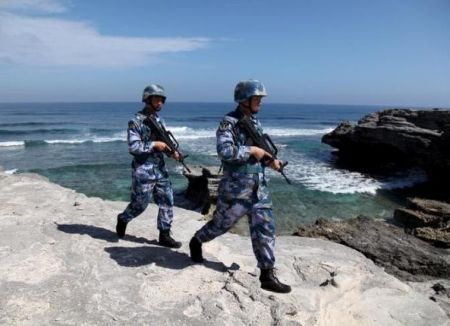 | « Back to article | Print this article |
 China on Monday closed a part of the South China Sea for military manoeuvres as it moved quickly to assert control over the disputed waters after an international tribunal struck down its claims over the region.
China on Monday closed a part of the South China Sea for military manoeuvres as it moved quickly to assert control over the disputed waters after an international tribunal struck down its claims over the region.
The People’s Liberation Army Air Force has conducted a combat air patrol with long range bombers in the South China Sea recently, which will become “a regular practice” in the future, a military spokesperson said.
The PLA sent H-6K long range strategic bombers and other aircraft including fighters, scouts and tankers to patrol islands and reefs including Huangyan Dao, state-run Xinhua news agency quoted Shen Jinke, spokesman for the PLA Air Force as saying.
During the mission, the aircraft carried out tasks including aerial scouting, air combat and island and reef patrol, fulfilling the patrol’s objective, Shen said.
The air force aims to promote real combat training over the sea, improve combat abilities against security threats and safeguard China’s sovereignty and security, he said.
“To effectively fulfil its mission, the air force will continue to conduct combat patrols on a regular basis in the South China Sea,” he said.
Shen pointed out that the South China Sea islands have been China’s territory since ancient times, and China’s rights and interests in relevant maritime areas should not be infringed upon.
“The PLA Air Force will firmly defend national sovereignty, security and maritime interests, safeguard regional peace and stability, and cope with various threats and challenges,” he said.
Separately the maritime administration in Hainan province, which overseas China’s expansive claims over the South China Sea said it is closing off a part of the sea for military exercises this week as China simultaneously moved on both air and the sea to establish firm control over the area which was awarded by the tribunal to the Philippines.
The maritime administration said that an area southeast of the island would be closed until July 12 without providing details about the nature of the military exercises.
Beijing’s moves followed after the tribunal appointed by the Hague-based Permanent Court of Arbitration last week quashed China’s claims of historic rights over the vast expanse of the South China Sea and upheld the Philippines’ claims under the UN Convention on Law of Seas.
China which boycotted the tribunal angrily rejected its verdict and said the award would not impact its claims over 90 per cent of the resource-rich sea.
Besides the Philippines, Vietnam, Malaysia, Brunei and Taiwan also firmly contest China’s claims in the region.
As China moved in with its military to assert its claims, the US which is backing the smaller states in the area to stand up to Beijing’s bid to forcefully establish control asked China to implement the verdict and settle the row peacefully with its neighbours who have counter claims over the area.
The new military manoeuvres by Beijing came in the midst of the visit to China on Monday by the US Navy’s top admiral, Chief of Naval Operations Admiral John Richardson, to discuss the South China Sea dispute in the aftermath of the verdict and ways to boost interactions between the two militaries.
Richardson met the head of the Chinese navy, Admiral Wu Shengli and held talks with him.
“It is very helpful for us to strengthen communication between us and build confidence. Of course it can help to improve our working and personal relationship,” Wu said.
Earlier, Sun Jianguo Chief of the Joint Staff Department of the China’s all powerful Central Military Commission, said the freedom of navigation issue “was bogus and one that certain countries repeatedly hyped up”.
Without directly mentioning US, he warned that freedom of navigation patrols carried out by foreign navies in the South China Sea could end “in disaster”.
Reiterating China’s stand that freedom of navigation in the South China Sea has never been affected, he said there won’t be a problem in future “as long as nobody plays tricks”.
Terming China as the biggest beneficiary of freedom of navigation in the South China Sea he was quoted as saying at a meeting that Beijing won’t let anybody damage it.
But at the same he said China consistently opposed “so-called military freedom of navigation” referring a number of US military vessels passing through waters close to artificial islands built by China in the South China Sea.
“This kind of military freedom of navigation is damaging to freedom of navigation in the South China Sea, and it could even play out in a disastrous way,” he said.
Image: Soldiers of China's People's Liberation Army Navy patrol on Woody Island, in the Paracel Archipelago, which is known in China as Xisha Islands. Photograph: Reuters